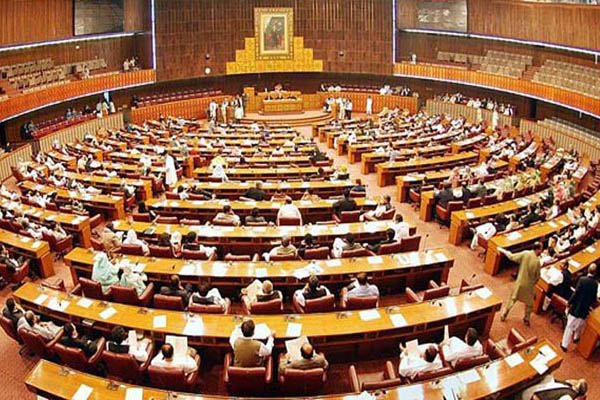
File photo
The National Assembly on Wednesday passed the Finance Bill, 2022 with little opposition through a majority vote, after reviewing it clause-by-clause.
Presented by Finance Minister Miftah Ismail earlier this month, the Rs. 9.5 trillion federal budget for fiscal year 2022-23 has changed significantly since, as the government has withdrawn several relief measures ostensibly in a bid to secure the revival of a suspended International Monetary Fund (IMF) loan facility. The government has also increased its revenue estimates beyond earlier claims, with the additional funding to be secured through new taxes.
Presenting the budget for approval, Minister of State for Finance and Revenue Aisha Ghous Pasha sought to dismiss the perception of an “IMF imposed” budget, stressing 80 percent of the changes the government had introduced over the past two weeks were related to taxes. “Our aim is to tax the rich and give relief to the poor,” she reiterated, adding that the incumbent government was implementing the agreements the ousted PTI-led government had inked with the global lender.
Among the measures approved by the Lower House of Parliament during Wednesday’s proceedings was an amendment allowing the government to impose a maximum levy of Rs. 50 on petroleum products, against the existing maximum permissible amount of Rs. 30. Seeking to defend this, the finance minister claimed he had no plans to impose the new maximum, but admitted that some would need to be imposed, as currently there was no levy on petroleum products.
Also approved were amendments allowing for collection of sales tax from traders through their electricity bills; a 5 percent tax on the services of I.T. and software consultants; and additional tax measures on salaried individuals. As already reported, the government has imposed zero income tax on those earning Rs. 50,000 or less/month; 2.5 percent tax on those earning between Rs. 50,001 and Rs. 100,000; a fixed tax of Rs. 15,000/year and 12.5 percent of the amount exceeding Rs. 100,000 for those earning between Rs. 100,001 and Rs. 200,000; a fixed tax of Rs. 136,000/year plus 20 percent of the amount exceeding Rs. 200,001 and below Rs. 300,000; a fixed tax of Rs. 405,000 plus 25 percent of the amount exceeding Rs. 300,001 and below Rs. 500,000/month; a fixed tax of Rs. 10 million plus 32.5 percent of the amount exceeding Rs. 500,001 and below Rs. 1 million/month; and a fixed tax of Rs. 2.9 million plus 35 percent of the amount exceeding Rs. 1 million/month.
The Lower House of Parliament also approved the imposition of a “super tax” of 1-4 percent for those earning between Rs. 150 million to Rs. 300 million per year and a 10 percent “super tax” on large-scale industries.
Overall, the government has set a tax collection target of Rs. 7.47 trillion, up from Rs. 7 trillion in the Finance Bill presented prior to revisions. By contrast, the target for non-tax revenues has been revised down from Rs. 2 trillion to Rs. 1.94 trillion.
